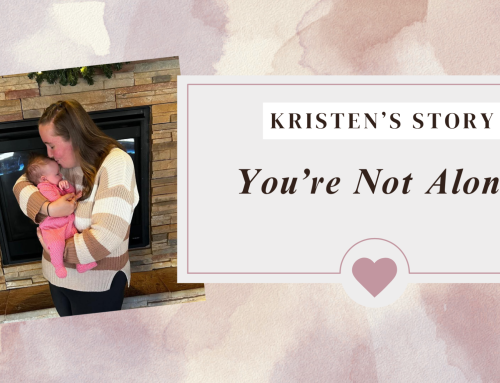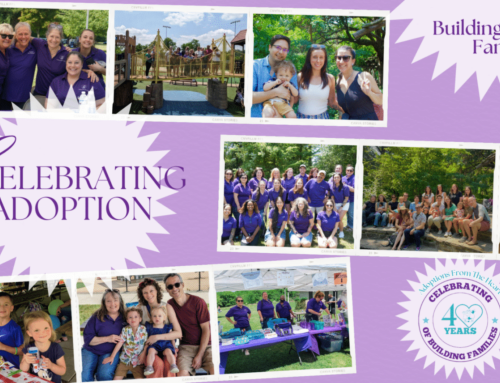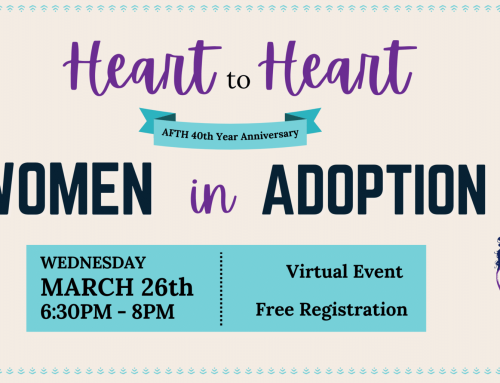
Whether you’re just beginning your adoption journey or well into the process, it’s crucial to understand the importance of positive adoption language. Positive adoption language is a term the adoption community uses to describe appropriate, constructive terminology. When discussing adoption, some negative words and phrases should be avoided. Many people don’t realize these outdated terms are offensive to the adoption community, so educating yourself on positive language is important.
Using positive adoption language demonstrates respect for the adoption triad. Although adoption is a beautiful family-building process, it can be a sensitive subject to some. Every adoption journey looks different, and practicing mindfulness and self-awareness before speaking about it is necessary.
This guide will first break down the do’s and don’ts of adoption language. We will recommend alternative phrases to use that have a more positive message. We’ll also explain why some terminology is harmful and how it can offend the adoption community.
In the following section, you will find commonly asked questions that are insensitive and negative. Often, people mindlessly ask invasive questions about adoption. Whether you’re asking a birth mom, adoptive parents, or an adoptee, certain questions or statements should be avoided out of respect.
Finally, in the last section, you will find links to external resources such as articles, webinars, and more. Here you can learn more about positive adoption language and its impact.
Don’t say: Gave away your child, abandoned your child, or put up your child for adoption.
Why? These terms have negative connotations and imply that the birth mother is surrendering her child because she doesn’t want them. Placing a child for adoption is in the child’s best interest. In no way is it a malicious or greedy act. Words like these can be incredibly hurtful to the birth mother. They invalidate the love and devotion the birth mother has for her child.
Do say: Placed a child for adoption, created an adoption plan, or made adoption arrangements.
Don’t say: Real mom, real dad, or real parents.
Why? The term ‘real’ is offensive to the adoption triad. It dismisses adoptive parents and the very important role they play in the child’s life. Using the term ‘real’ to identify biological parents is insensitive and should be avoided.
Do say: Biological mom, biological dad, biological parents, birth mother, birth father, or birth parents.
Don’t say: Keep or take the child.
Why? Using possessive terms to describe a child’s home situation is harmful to the adoption triad.
Do say: Choosing to parent the child.
Don’t say: Unwanted child.
Why? Not only is this false, but extremely harmful to the adoption triad. It can make the adoptee feel insecure and self-conscious. It can also wrongly accuse the birth parents of not wanting their child. In reality, they most likely just want a better life for their child.
Do say: Child placed for adoption.
Don’t say: The birth mom/dad is selfish.
Why? Adoption is a selfless act of love and care. Placing a child for adoption means giving that child a better quality of life and opportunity. It gives them a chance to reach their fullest potential and enjoy the possibilities of life. Adoption is no selfish act; it takes a very brave and courageous birth mother to put her child above herself.
Do say: The birth mom/dad is selfless/
Questions you shouldn’t ask:
The following questions are commonly asked but never should be. They are invasive of the adoption triad’s privacy and can also come across as offensive.
How much did your child cost?
Why did their mom give them up?
Doesn’t having the birth parent(s) around confuse the kid?
Couldn’t you have raised the child if you really wanted to?
What are you going to tell the child when they’re older?
Couldn’t you have your own children?
Where are the real parents?
Does the child know they’re adopted?
Most times, it’s best you don’t ask questions. If you are curious, be conscious of your tone, language, facial expressions, and words before you ask any questions. Be hesitant and careful with sensitive subjects. Practice mindfulness and allow them to share what they are comfortable with. If you have difficulty understanding their situation, be patient and empathetic. Refrain from assuming you know the entirety of their adoption process. Each plan, process, and reason for placing is different.
Resources
There are endless resources that can educate you on positive adoption language. The blogs below give further guidance on this topic by providing easy-to-understand tips and pointers. Adoption From The Heart’s YouTube channel, AFTH TV, and podcast, A Heart-To-Heart With Adoptions From The Heart also offer great advice.
Blogs:
Using Positive Adoption Language
Why Positive Adoption Language Matters
Honest Adoption Language vs. Positive Adoption Language
Videos:
The Importance of Not Oversharing Your Child’s Adoption Story
Adoption terminology: using positive adoption language!
Positive and Negative Adoption Language
Podcast:
Unique Family Care, Language, and the Importance of Training in the Hospital Setting





